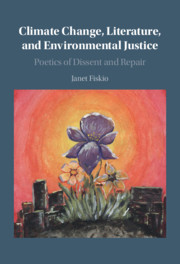Book contents
- Climate Change, Literature, and Environmental Justice
- Climate Change, Literature, and Environmental Justice
- Copyright page
- Dedication
- Contents
- Acknowledgments
- Introduction “A Fault Line of Pain”
- Chapter 1 “Fear of a Black Planet”
- Chapter 2 Ghosts and Reparations
- Chapter 3 Mapping and Memory
- Chapter 4 “Bodies Tell Stories”
- Chapter 5 Round Dance and Resistance
- Chapter 6 “Slow Insurrection”
- Chapter 7 Cannibal Spirits and Sacred Seeds
- Epilogue “Everyday Micro-utopias”
- Works Cited
- Index
Chapter 7 - Cannibal Spirits and Sacred Seeds
Published online by Cambridge University Press: 13 April 2021
- Climate Change, Literature, and Environmental Justice
- Climate Change, Literature, and Environmental Justice
- Copyright page
- Dedication
- Contents
- Acknowledgments
- Introduction “A Fault Line of Pain”
- Chapter 1 “Fear of a Black Planet”
- Chapter 2 Ghosts and Reparations
- Chapter 3 Mapping and Memory
- Chapter 4 “Bodies Tell Stories”
- Chapter 5 Round Dance and Resistance
- Chapter 6 “Slow Insurrection”
- Chapter 7 Cannibal Spirits and Sacred Seeds
- Epilogue “Everyday Micro-utopias”
- Works Cited
- Index
Summary
In “Cannibal Spirits and Sacred Seeds,” I describe Indigenous food practices as historical and contemporary forms of decolonial care. The chapter remembers the starvation regimes imposed by settler colonial governments as modes of subjugation. In this context, the writings of Louise Erdrich (Turtle Mountain Band) and Winona LaDuke (Mississippi Band) focus on the significance of food sovereignty to Indigenous resistance. Erdrich’s novel Tracks, set in the early twentieth century, centers resistance to colonization and dispossession, depicting the construction of hunger and the destruction of Indigenous foodways. LaDuke’s collection of essays, All Our Relations, offers case studies of protection of land and struggles under ongoing settler colonialism. LaDuke describes land seizure and toxic pollution but continues into the present with the reclamation of food sovereignty. Through these works the ongoing impacts of settler colonialism on Indigenous bodies, communities, and practices are made visible. But these writers also depict Indigenous foodways as centers of knowledge, life, and continuance. Food sovereignty is central to ongoing resistance in the context of climate disruption, visible in the kitchens of pipeline blockades, where Indigenous peoples oppose the most recent forms of dispossession and hunger. Daily acts of cooking, in these communities, are practices of decolonial care.
- Type
- Chapter
- Information
- Climate Change, Literature, and Environmental JusticePoetics of Dissent and Repair, pp. 162 - 177Publisher: Cambridge University PressPrint publication year: 2021



